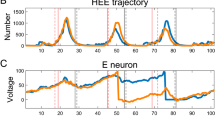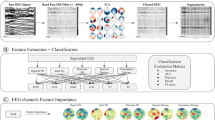Abstract
It is very important to estimate the unknown parameters of the fractional-order memristor-based chaotic systems (FOMCSs). In this study, a brain-inspired state transition algorithm (BISTA) is proposed to estimate the parameters of the FOMCSs. In order to generate a better initial population, a novel initialization approach based on opposition-based learning is presented. To balance the global search and local search, and accelerate the convergence speed, the mutual learning and selective learning are proposed in the optimization process. The performance of the proposed algorithm is comprehensively evaluated on two typical FOMCSs. The simulation results and statistical analysis have demonstrated the effectiveness of the proposed algorithm. For the fractional-order memristor-based Lorenz system, the proposed method can increase the estimated value of parameters by at least one order of magnitude compared with the other methods.









Similar content being viewed by others
References
Zhao Y, Zhang W, Su H, Yang J (2018) Observer-based synchronization of chaotic systems satisfying incremental quadratic constraints and its application in secure communication. IEEE Transactions on Systems Man, and Cybernetics: Systems 50(12):5221–5232
Wu X, Shen S (2009) Chaos in the fractional-order lorenz system. Int J Comput Math 86 (7):1274–1282
Zhang W, Zhou S, Li H, Zhu H (2009) Chaos in a fractional-order rössler system. Chaos, Solitons & Fractals 42(3):1684–1691
Li C, Chen G (2004) Chaos in the fractional order chen system and its control. Chaos, Solitons & Fractals 22(3):549–554
Chua L (1971) Memristor-the missing circuit element. IEEE Transactions on Circuit Theory 18 (5):507–519
Khalid M (2019) Review on various memristor models, characteristics, potential applications, and future works. Trans Electr Electron Mater 20(4):289–298
Petras I (2010) Fractional-order memristor-based chua’s circuit. IEEE Trans Circuits Syst II Express Briefs 57(12):975–979
Cafagna D, Grassi G (2012) On the simplest fractional-order memristor-based chaotic system. Nonlinear Dyn 70(2):1185–1197
Teng L, Iu HH, Wang X, Wang X (2014) Chaotic behavior in fractional-order memristor-based simplest chaotic circuit using fourth degree polynomial. Nonlinear Dyn 77(1):231–241
Huang X, Jia J, Li Y, Wang Z (2016) Complex nonlinear dynamics in fractional and integer order memristor-based systems. Neurocomputing 218:296–306
Xi H, Li Y, Huang X (2014) Generation and nonlinear dynamical analyses of fractional-order memristor-based lorenz systems. Entropy 16(12):6240–6253
Gu Y, Wang H, Yu Y (2020) Synchronization for commensurate riemann-liouville fractional-order memristor-based neural networks with unknown parameters. J Frankl Inst 357(13):8870–8898
Liu H, Chi J, Li Z, Zeng Z, Lü J. (2021) Parameter identification of memristor-based chaotic systems via the drive-response synchronization method. IEEE Trans Circuits Syst II Express Briefs 68 (6):2082–2086
Gu Y, Yu Y, Wang H (2017) Synchronization-based parameter estimation of fractional-order neural networks. Physica A 483:351–361
Lei Z, Gao S, Zhang Z, Zhou M, Cheng J (2022) Mo4: a many-objective evolutionary algorithm for protein structure prediction. IEEE Trans Evol Comput 26(3):417–430
Li K, Chen R, Fu G, Yao X (2019) Two-archive evolutionary algorithm for constrained multiobjective optimization. IEEE Trans Evol Comput 23(2):303–315
Camacho-Villalón CL, Dorigo M, Stützle T (2022) Pso-x: a component-based framework for the automatic design of particle swarm optimization algorithms. IEEE Trans Evol Comput 26(3):402–416
Wang G-G, Deb S, Cui Z (2019) Monarch butterfly optimization. Neural Comput Appl 31 (7):1995–2014
Wang G-G (2018) Moth search algorithm: a bio-inspired metaheuristic algorithm for global optimization problems. Memetic Computing 10(2):151–164
Yang Y, Chen H, Heidari AA, Gandomi AH (2021) Hunger games search: visions, conception, implementation, deep analysis, perspectives, and towards performance shifts. Expert Syst Appl 177:114864
Ahmadianfar I, Heidari AA, Gandomi AH, Chu X, Chen H (2021) Run beyond the metaphor: an efficient optimization algorithm based on runge kutta method. Expert Syst Appl 181:115079
Houssein EH, Helmy BE-D, Rezk H, Nassef AM (2021) An enhanced archimedes optimization algorithm based on local escaping operator and orthogonal learning for pem fuel cell parameter identification. Eng Appl Artif Intell 103:104309
Peng Y, He S, Sun K (2022) Parameter identification for discrete memristive chaotic map using adaptive differential evolution algorithm. Nonlinear Dyn 107(1):1263–1275
Fathy A, Elaziz MA, Sayed ET, Olabi AG, Rezk H (2019) Optimal parameter identification of triple-junction photovoltaic panel based on enhanced moth search algorithm. Energy 188:116025
Zhou X, Yang C, Gui W (2012) State transition algorithm. Journal of Industrial and Management Optimization 8(4):1039–1056
Zhou X, Gao Y, Li C, Huang Z (2022) A multiple gradient descent design for multi-task learning on edge computing: multi-objective machine learning approach. IEEE Transactions on Network Science and Engineering 9(1):121–133
Huang Z, Yang C, Zhou X, Gui W (2018) A novel cognitively inspired state transition algorithm for solving the linear bi-level programming problem. Cogn Comput 10(5):816–826
Huang Z, Yang C, Zhou X, Yang S (2020) Energy consumption forecasting for the nonferrous metallurgy industry using hybrid support vector regression with an adaptive state transition algorithm. Cogn Comput 12(2):357–368
Huang Z, Yang C, Chen X, Zhou X, Chen G, Huang T, Gui W (2021) Functional deep echo state network improved by a bi-level optimization approach for multivariate time series classification. Appl Soft Comput 106:107314
Huang Z, Yang C, Zhou X, Huang T (2018) A hybrid feature selection method based on binary state transition algorithm and relieff. IEEE J Biomed Health Inform 23(5):1888–1898
Huang Z, Yang C, Chen X, Huang K, Xie Y (2020) Adaptive over-sampling method for classification with application to imbalanced datasets in aluminum electrolysis. Neural Comput Appl 32(11):7183–7199
Zhou X, Yang C, Gui W (2018) A statistical study on parameter selection of operators in continuous state transition algorithm. IEEE Transactions on Cybernetics 49(10):3722–3730
Zhou X, Tian J, Wang Z, Yang C, Huang T, Xu X (2022) Nonlinear bilevel programming approach for decentralized supply chain using a hybrid state transition algorithm. Knowledge-based Systems 108119
Han J, Yang C, Lim C. -C., Zhou X, Shi P (2022) Stackelberg game approach for robust optimization with fuzzy variables. IEEE Trans Fuzzy Syst 30(1):258–269
Pierezan J, Dos Santos Coelho L (2018) Coyote optimization algorithm: a new metaheuristic for global optimization problems. In: 2018 IEEE Congress on evolutionary computation (CEC), pp 1–8
Hansen N, Müller SD, Koumoutsakos P (2003) Reducing the time complexity of the derandomized evolution strategy with covariance matrix adaptation (cma-es). Evol Comput 11(1):1–18
Ahmadianfar I, Bozorg-Haddad O, Chu X (2020) Gradient-based optimizer: a new metaheuristic optimization algorithm. Inf Sci 540:131–159
Tanabe R, Fukunaga AS (2014) Improving the search performance of shade using linear population size reduction
Brest J, Maučec MS, Bošković B (2017) Single objective real-parameter optimization: Algorithm jso. In: 2017 IEEE Congress on evolutionary computation (CEC), pp 1311–1318
Kumar A, Misra RK, Singh D (2017) Improving the local search capability of effective butterfly optimizer using covariance matrix adapted retreat phase. In: 2017 IEEE Congress on evolutionary computation (CEC), pp 1835–1842
Sun X, Shi Z, Zhu J (2021) Multiobjective design optimization of an ipmsm for evs based on fuzzy method and sequential taguchi method. IEEE Trans Ind Electron 68(11):10592–10600
Rakkiyappan R, Sivasamy R, Park JH (2014) Synchronization of fractional-order different memristor-based chaotic systems using active control. Can J Phys 92(12):1688–1695
Carrasco J, García S, Rueda MM, Das S, Herrera F (2020) Recent trends in the use of statistical tests for comparing swarm and evolutionary computing algorithms: Practical guidelines and a critical review. Swarm Evol Comput 54:100665
Acknowledgements
The authors thank the National Natural Science Foundation of China (Grant Nos. 62103444 and 62273357), and the Hunan Provincial Natural Science Foundation of China (Grant No. 2021JJ20082) for their funding support.
Author information
Authors and Affiliations
Corresponding author
Additional information
Publisher’s note
Springer Nature remains neutral with regard to jurisdictional claims in published maps and institutional affiliations.
Chunhua Yang, Xiaojun Zhou, Weihua Gui and Tingwen Huang are contributed equally to this work.
Rights and permissions
Springer Nature or its licensor (e.g. a society or other partner) holds exclusive rights to this article under a publishing agreement with the author(s) or other rightsholder(s); author self-archiving of the accepted manuscript version of this article is solely governed by the terms of such publishing agreement and applicable law.
About this article
Cite this article
Huang, Z., Yang, C., Zhou, X. et al. Brain-inspired STA for parameter estimation of fractional-order memristor-based chaotic systems. Appl Intell 53, 18653–18665 (2023). https://doi.org/10.1007/s10489-022-04435-x
Accepted:
Published:
Issue Date:
DOI: https://doi.org/10.1007/s10489-022-04435-x




